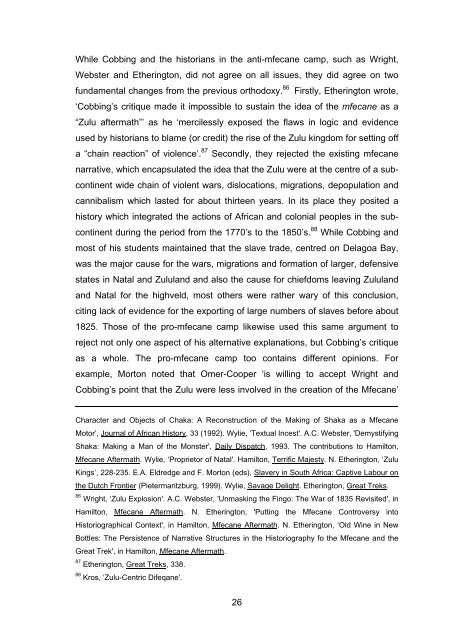The Historiographical Development of the Concept “mfecane” and ...
The Historiographical Development of the Concept “mfecane” and ...
The Historiographical Development of the Concept “mfecane” and ...
You also want an ePaper? Increase the reach of your titles
YUMPU automatically turns print PDFs into web optimized ePapers that Google loves.
While Cobbing <strong>and</strong> <strong>the</strong> historians in <strong>the</strong> anti-mfecane camp, such as Wright,<br />
Webster <strong>and</strong> E<strong>the</strong>rington, did not agree on all issues, <strong>the</strong>y did agree on two<br />
fundamental changes from <strong>the</strong> previous orthodoxy. 86 Firstly, E<strong>the</strong>rington wrote,<br />
‘Cobbing’s critique made it impossible to sustain <strong>the</strong> idea <strong>of</strong> <strong>the</strong> mfecane as a<br />
“Zulu aftermath”’ as he ‘mercilessly exposed <strong>the</strong> flaws in logic <strong>and</strong> evidence<br />
used by historians to blame (or credit) <strong>the</strong> rise <strong>of</strong> <strong>the</strong> Zulu kingdom for setting <strong>of</strong>f<br />
a “chain reaction” <strong>of</strong> violence’. 87 Secondly, <strong>the</strong>y rejected <strong>the</strong> existing mfecane<br />
narrative, which encapsulated <strong>the</strong> idea that <strong>the</strong> Zulu were at <strong>the</strong> centre <strong>of</strong> a sub-<br />
continent wide chain <strong>of</strong> violent wars, dislocations, migrations, depopulation <strong>and</strong><br />
cannibalism which lasted for about thirteen years. In its place <strong>the</strong>y posited a<br />
history which integrated <strong>the</strong> actions <strong>of</strong> African <strong>and</strong> colonial peoples in <strong>the</strong> sub-<br />
continent during <strong>the</strong> period from <strong>the</strong> 1770’s to <strong>the</strong> 1850’s. 88 While Cobbing <strong>and</strong><br />
most <strong>of</strong> his students maintained that <strong>the</strong> slave trade, centred on Delagoa Bay,<br />
was <strong>the</strong> major cause for <strong>the</strong> wars, migrations <strong>and</strong> formation <strong>of</strong> larger, defensive<br />
states in Natal <strong>and</strong> Zulul<strong>and</strong> <strong>and</strong> also <strong>the</strong> cause for chiefdoms leaving Zulul<strong>and</strong><br />
<strong>and</strong> Natal for <strong>the</strong> highveld, most o<strong>the</strong>rs were ra<strong>the</strong>r wary <strong>of</strong> this conclusion,<br />
citing lack <strong>of</strong> evidence for <strong>the</strong> exporting <strong>of</strong> large numbers <strong>of</strong> slaves before about<br />
1825. Those <strong>of</strong> <strong>the</strong> pro-mfecane camp likewise used this same argument to<br />
reject not only one aspect <strong>of</strong> his alternative explanations, but Cobbing’s critique<br />
as a whole. <strong>The</strong> pro-mfecane camp too contains different opinions. For<br />
example, Morton noted that Omer-Cooper ‘is willing to accept Wright <strong>and</strong><br />
Cobbing’s point that <strong>the</strong> Zulu were less involved in <strong>the</strong> creation <strong>of</strong> <strong>the</strong> Mfecane’<br />
Character <strong>and</strong> Objects <strong>of</strong> Chaka: A Reconstruction <strong>of</strong> <strong>the</strong> Making <strong>of</strong> Shaka as a Mfecane<br />
Motor’, Journal <strong>of</strong> African History, 33 (1992). Wylie, ‘Textual Incest'. A.C. Webster, 'Demystifying<br />
Shaka: Making a Man <strong>of</strong> <strong>the</strong> Monster', Daily Dispatch, 1993. <strong>The</strong> contributions to Hamilton,<br />
Mfecane Aftermath. Wylie, ‘Proprietor <strong>of</strong> Natal'. Hamilton, Terrific Majesty. N. E<strong>the</strong>rington, ‘Zulu<br />
Kings’, 228-235. E.A. Eldredge <strong>and</strong> F. Morton (eds), Slavery in South Africa: Captive Labour on<br />
<strong>the</strong> Dutch Frontier (Pietermaritzburg, 1999). Wylie, Savage Delight. E<strong>the</strong>rington, Great Treks.<br />
86 Wright, ‘Zulu Explosion'. A.C. Webster, 'Unmasking <strong>the</strong> Fingo: <strong>The</strong> War <strong>of</strong> 1835 Revisited', in<br />
Hamilton, Mfecane Aftermath. N. E<strong>the</strong>rington, 'Putting <strong>the</strong> Mfecane Controversy into<br />
<strong>Historiographical</strong> Context', in Hamilton, Mfecane Aftermath. N. E<strong>the</strong>rington, ‘Old Wine in New<br />
Bottles: <strong>The</strong> Persistence <strong>of</strong> Narrative Structures in <strong>the</strong> Historiography fo <strong>the</strong> Mfecane <strong>and</strong> <strong>the</strong><br />
Great Trek', in Hamilton, Mfecane Aftermath.<br />
87 E<strong>the</strong>rington, Great Treks, 338.<br />
88 Kros, ‘Zulu-Centric Difeqane'.<br />
26

















